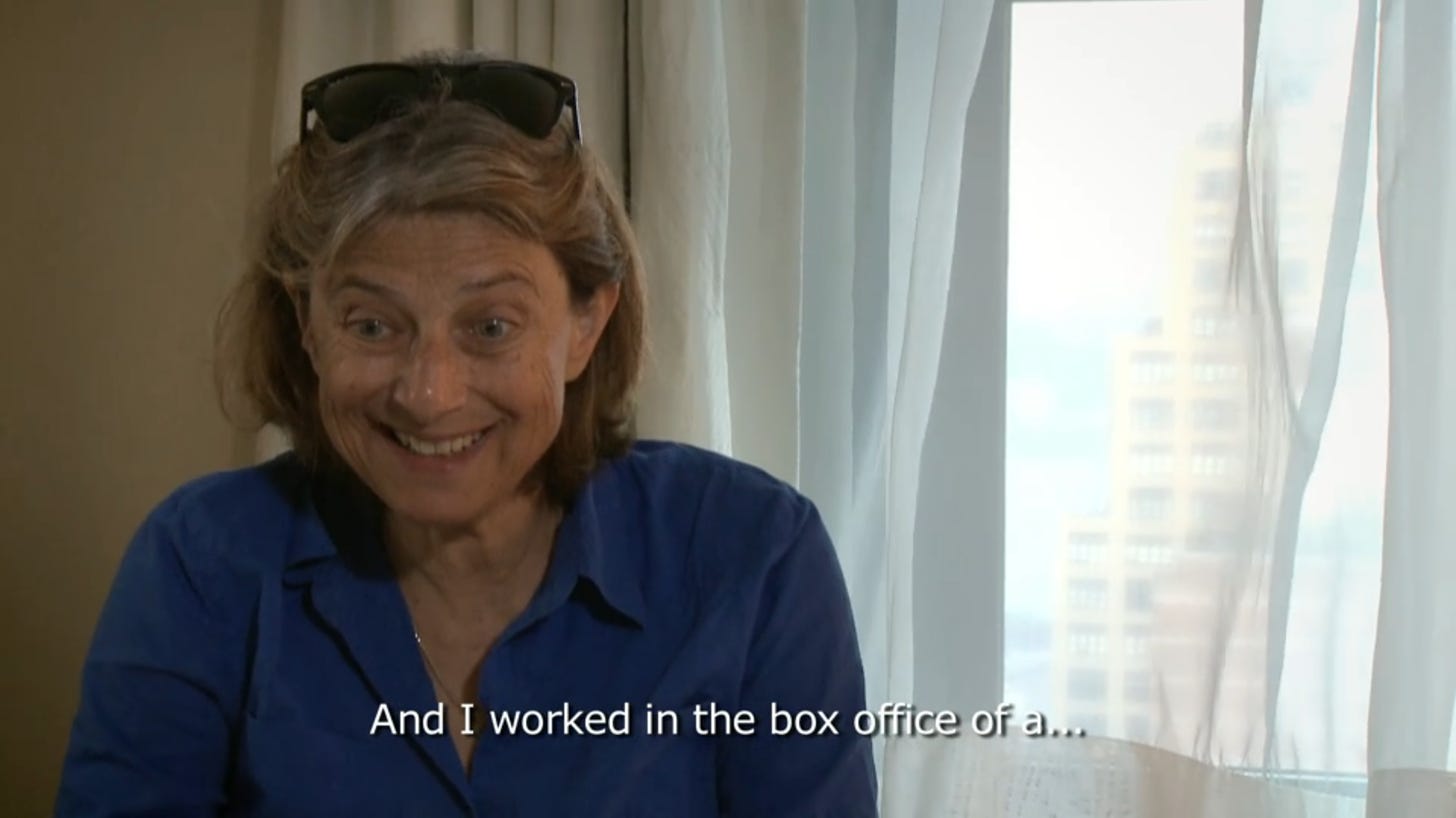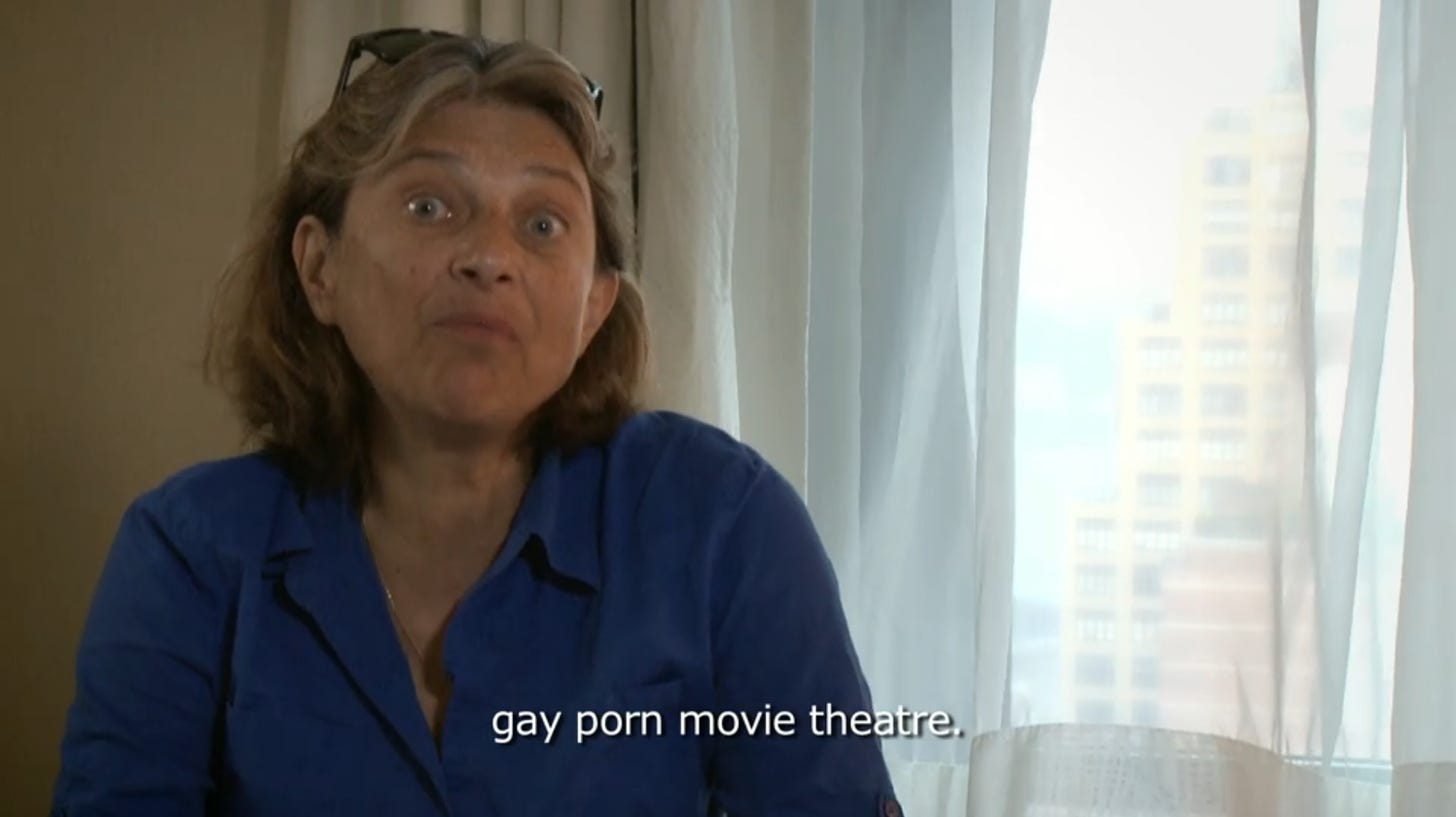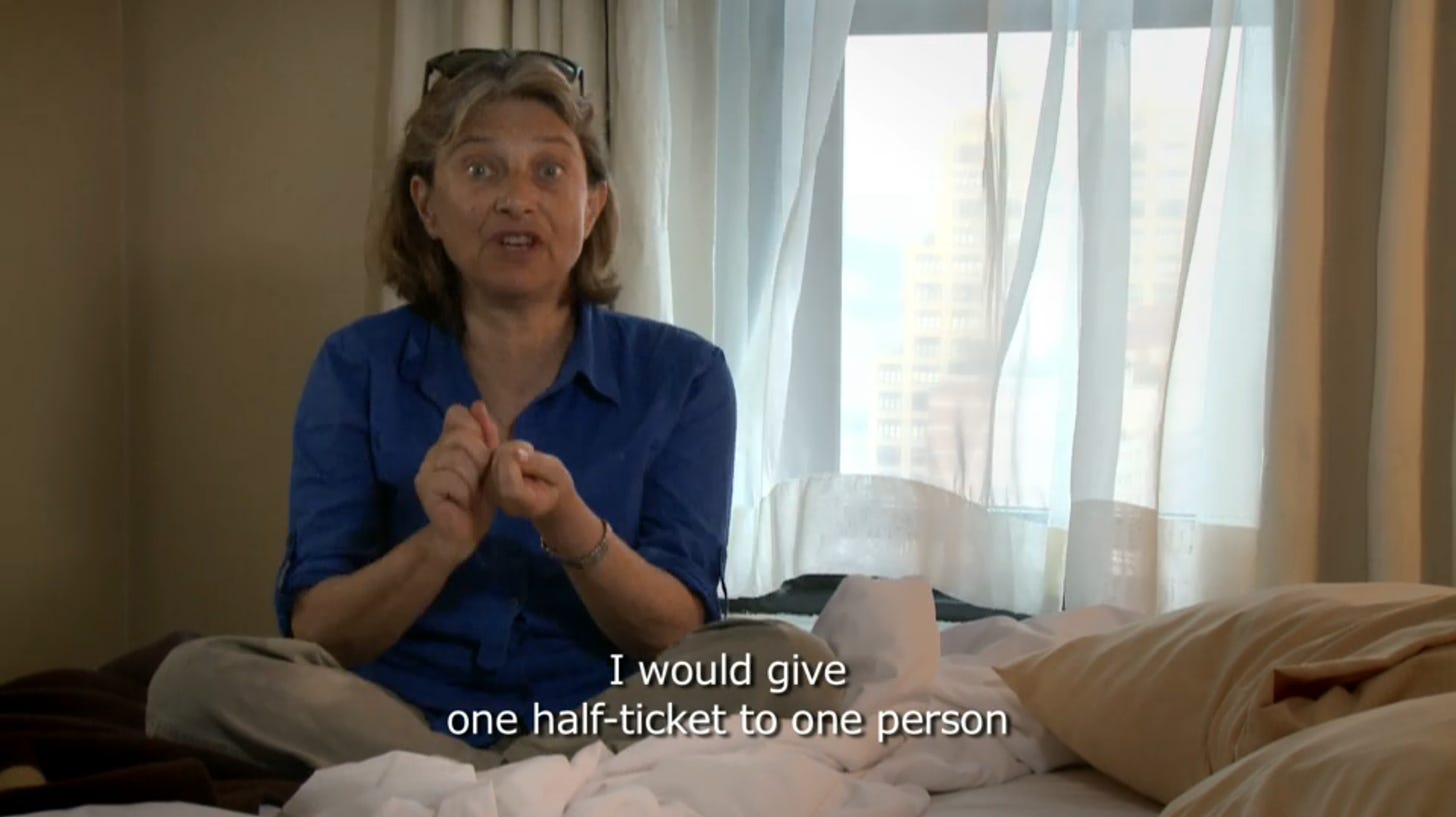Welcome to the latest issue of Subtle Maneuvers. Previously: Samuel Johnson and the art of procrastination.
Chantal Akerman (1950–2015)
Last week, I decided I had to do something about my tabs. You know the story: one browser window, approximately one million tabs. Most were articles that I intended to read at some future date, and mostly I decided: OK, enough, I admit defeat, you are released.
But one tab I paused over: the rental screen for an hourlong documentary about the late Belgian filmmaker Chantal Akerman. I couldn’t remember when or why I landed on this film, but I thought: There must be some reason, I’ll just watch it.
A good decision! The film immediately turned up a useful tidbit for my ongoing/never-ending book project, about how Akerman financed her early films, which I think is best conveyed in screengrabs. These are from the very beginning of the documentary, when Akerman is talking about first arriving in New York City, in 1971:
Ha! Admittedly, the story is a little unclear—I’m assuming Akerman would pocket the money for every other ticket she sold, which is why she ripped the tickets in half. Later, she also describes stealing boxes of 35mm film from a film lab.
I enjoyed Akerman’s presence so much that I ended up watching another documentary about her, from 2011. This one was just a long interview, and Akerman seems a little annoyed to be there, as if she had agreed to participate at some earlier point and now regretted it. But it still had some amazing insights into her process, like when the interviewer asks about Akerman’s writing routine:
Now let’s talk about the script. The writer and filmmaker Paul Auster—New York Trilogy—says that he sits every morning and writes until the end of the day.
My god.
And by the end of the day, if he gets a line, it’s a good day. And if he gets one page, a whole page, it’s an excellent day. How is your methodology to write? Do you have a methodology?
No. [Laughs] I try, you know. I try and it’s coming or not coming. But I don’t stay for the whole day. It would drive me crazy. And then I walk in the street. And by walking—you know, if I’m blocked, walking is very good. I should tell that to Paul Auster, he will have then more than one line.
I’m not a man, you know, who has that “methodology.” It’s much more fluid. One day it works, another day it doesn’t. Then I walk and, I don’t know, I could read the paper. And my brain, in a way it’s still working. And the next day, I have more. Or not—it depends.
But I have no methodology. Only one thing: When I’m writing, I’m getting up very early. And nobody should talk to me. So I’m with myself. And I like to write on the weekend, because you feel everybody’s gone. I feel it, and [those are] usually good days. Saturday and Sunday are my best days.
I can relate! I always intend to write this newsletter on the preceding Friday but frequently end up doing it on Sunday . . . and I feel like the writing goes much better on Sunday? Partly because of the power of procrastination, of course, but also because it feels like stolen time—and, like Akerman, I delight in my petty theft.
Another thing I loved in the two documentaries is Akerman’s emphasis on instinct. With her fiction films, she of course had to do a great deal of planning, which for her was the worst part. (“The whole thing is annoying,” she says.) Documentaries allowed her greater latitude:
When I make a documentary, I want to begin with no ideas, without knowing anything. Just be there like a sponge. When people ask me, “What are you going to do?” I say, “I don’t know.” And it’s true. If you start with no ideas, something happens, something subtle, less black-and-white, and more open on the world, something particularly evocative.
At another point, Akerman says that the work “has to come from somewhere which is half conscious, half unconscious. If it’s totally conscious, it’s dead. And, again, the unconsciousness brings out something which you were not expecting, which is usually the richness of the work.”
I like that last idea in particular: “the richness of the work” is precisely the part you didn’t plan, the part you can’t plan, the part that comes up only during the making of the work. Or doesn’t come up.
DELUSION TIME
As I was thinking about all of this, I had a really nice chat with the photographer
for a podcast experiment she’s running on her Substack, . The topic was: Do you have to be a little bit delusional to be an artist? Listen here!And definitely subscribe to Aunt Jackie; I especially appreciated her recent piece, “Why I’m no longer working past 2pm.”
MORE FILMMAKERS’ PROCESSES
Previously, I’ve written about Joanna Hogg, David Lynch, Hayao Miyazaki, Jafar Panahi, Roberto Rossellini, and the film composer Ennio Morricone. Plus, don’t miss this amazing anecdote about Stanley Kubrick funding his films!
THE GREATEST?
It would be seriously remiss of me to write about Akerman and not at least mention her 1975 film Jeanne Dielman, 23, quai du Commerce, 1080 Bruxelles. In the latest Sight and Sound greatest-films-of-all-time poll, the voters ranked it as, um, the greatest film of all time, so definitely watch it if you haven’t already. (It’s streaming on Criterion and Max.) Akerman was only 24 years old when she made it!
GET THE MONEY!
I will also forever love Akerman for this Facebook exchange that, thank god, someone screen-grabbed for posterity:
Thanks for reading! If you’ve been influenced by me (just a little?), please consider joining the 1.2 percent of readers who support this newsletter with a paid subscription. Or buy my first book in hardcover and I will receive $3.31 in about a year!















I knew Chantal a little, especially on a film festival jury in Spain. And it’s absolutely true that, whenever some starstruck filmmaker would timidly approach her and start with “I love your work, it’s been such a formative influence on my own ...”, she would immediately thrust out her open palm and yell at them: “SO PAY ME!!” Which usually sent them running quick-smart ...
The tabs….the millions of open tabs. I feel the shame any time I have to share my screen and the people watching gasp at how many are open on my computer. Is it a sign of creativity “in-progress”? Lol. I hope! In any case, I’m glad you kept this tab open so we could enjoy some wisdom from my fav filmmaker. If I had any money, I would give it to her. She’s given us so much. And the line “I’m not a man, you know, who has that “methodology.” It’s much more fluid. One day it works, another day it doesn’t.” -so well put.
I recently read an interview with a young female filmmaker who described a similarly intuitive approach to making films to her producer who warned her never to mention such a lack of “method” to prospective distributors and funders. Thank god the filmmaker’s response was “fuck that.” Bless the youth. They will save us.